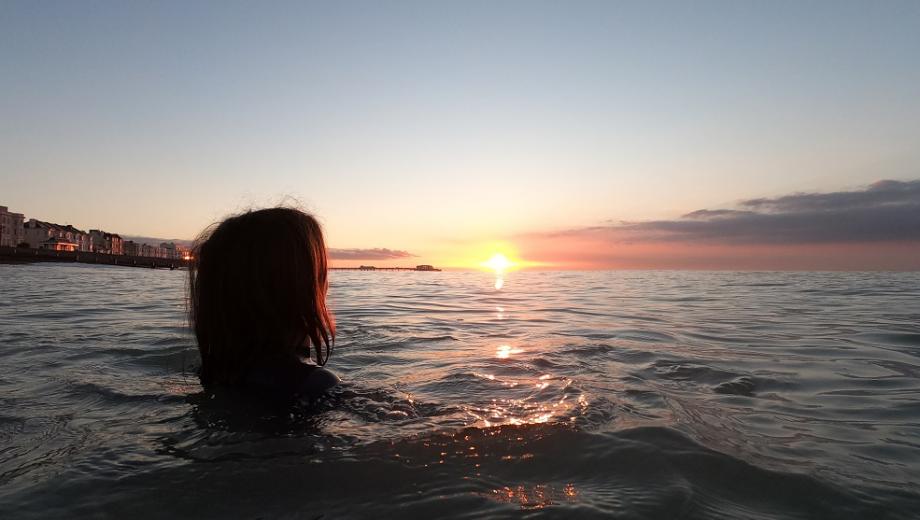
With increased numbers of people taking to sea-swimming during lockdowns, West Sussex Mind carried out some research to see if it helps their mental, as well as physical, well-being.
The benefit of cold water immersion on physical well-being has long been recognised– be it open-water swimming in the sea or lakes, or taking cold showers and baths. Research has found that ice baths can help athletes recuperate more quickly, and that inflammation can be reduced by applying ice.
But the positive impact on mental health has only recently been established.
Since the first lockdown began in March 2020, there has been a notable increase in the number of sea swimmers along the West Sussex coast, with people swimming regularly in spots between Shoreham Harbour and Worthing and beyond. Clearly, people have been finding ways to keep up their regular exercise regimes even when the swimming pools have been closed.
West Sussex Mind was interested in seeing just how much people’s mental health has benefited from being in cold water at a time when many people are feeling more anxious and stressed.
Zoe Manders has set herself the challenge of dipping into the sea in Worthing every day throughout March with a friend – with the aim of fundraising for West Sussex Mind at the same time. She explained how her daily swim makes her feel calmer and more at ease.
‘Being in the sea makes me aware of the larger cycle of life, that there’s a much bigger thing going on. It’s very mindful, because the water is cold you can’t think about anything else… and when you turn back and look at seafront, there’s a perspective shift.’
She is also keen to stress how the positive effects of cold water immersion remain after her swim.
‘I come out buzzing, and I feel like that for the rest of the day… Now I want to get into the water regardless of the weather; it’s become a bit of a habit.’
So are these feelings of well-being shared by other swimmers? West Sussex Mind carried out its own research into cold water immersion. A short Survey Monkey questionnaire was sent out to a group of local sea swimmers, and from there it reached a wider audience, not necessarily restricted to West Sussex residents.
It’s fair to say a positive response was anticipated. Not just because of personal anecdotal evidence from swimmers like Zoe, but because of an awareness that some people in the community take cold water baths for their mental well-being. Despite this, there was some surprise at the very high percentage of people who reported the beneficial affects of cold water swimming/immersion on their mental health.
Of 40 respondents, 35 (88%) replied ‘yes’ to the question Do you think your mental health has improved as a result of cold water swimming/immersion?
What’s interesting is that none of the other five said a flat out ‘no’ but gave a range of reasons:
- One thinks they would see an improvement if they went more often (this respondent reported going less than once a month)
- One reported that they thought the whole ‘package’ helped them. Not just the swimming but cycling to and from the swim, and being able to connect to others despite social distancing and lockdown measures
- One has found it difficult to access the lakes they like to swim in because of lockdown restrictions – which has had implications for their mental health
- The other two didn’t know or couldn’t measure the improvement
The largest group (53%) reported cold water swimming/immersion more than once a week. Of these, 85% said they felt the positive benefit on their mental health, although this increased to 100% for the six people who swim or immerse themselves in cold water daily.
But it doesn’t necessarily follow that you need to do this every day to feel the benefit. Every one of the sixteen respondents who reported cold water swimming/immersion once a week or a few times a month felt their mental health benefited.
It goes without saying that we’re not advocating for anyone to go into the sea without first considering their physical well-being and safety, and taking medical advice where necessary.
But West Sussex Mind's survey shows that cold water swimming/immersion is helping many people through a difficult time. So much so that 88% of people in the survey said they will continue their regime after lockdown ends because they love it – although one was very certain that they can’t wait to get back to the warm pool!
You can follow Zoe Manders’ sea-dipping adventures on Instagram at @sussexseadippers.
This May, West Sussex Mind’s anti-stigma and mental health awareness campaign Moving Minds will be encouraging people to move more for their mental health. If you’d like to get involved, please contact Louisa Hernandez at louisa.hernandez@westsussexmind.org.
For further reading, including advice on how to start cold water immersion:
Cold comfort: How sea swimming boosts my mental health | Mind
Home of Open Water Swimming | Swim England
Open Water Swimming | UK Events Calendar 2021 - 2022 | Find A Race
Cold water immersion: kill or cure? - Tipton - 2017 - Experimental Physiology - Wiley Online Library
An edited version of this piece can be found on www.westsussexmind.org
Photo credit Zoe Manders